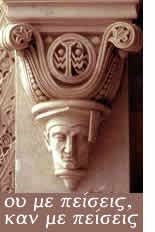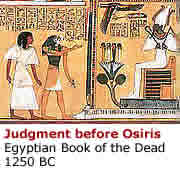| |||||||||||||||||||||||||||||||||
| Reasons > Scholarship > Con: Professor Jonathan Z. Smith |
| Scholar/ Myth maker? | Yes! | History of Scholarship | Amateur Scholarship | |
| Con: J. Z. Smith | Con: AD Nock | Con: BM Metzger | Sourcebooks | |
| Con: Habermas |
| "Dying and rising Gods" |
The apologists are right: some modern scholars have thrown over the idea of dying and rising Gods—but not not all of them, and certainly not how you'd think. Here's the skinny on the scholarship of the dying and rising Gods. |
Dying and rising God scholarship
got going back in 1890 when a guy named James
Frazer came out with a book called (Sir Jimmy had such a good time writing this thing that decades later he was still putting out updated versions; one is thirteen volumes long. If you're buying a used copy be careful—it's hard not to get the various version and volume numbers confused.) Frazer's idea was that all the way back to the third millennium BC, ancient middle eastern cultures had a "dying and rising God" cookie cutter they used to bake up new Gods, especially "vegetation Gods" that died and rejuvenated with the food growing seasons. Now, it's just the next paragraph and you've already cottoned to the same idea everyone else did when they read the Golden Bough: maybe that well known ancient middle eastern God Jesus was just cut cookie number forty seven. You won't be surprised to learn that not everyone was happy to hear Frazer's theory, and that ever since people have been arguing if Jimmy had things straight. Did Jimmy have things straight? Do much reading and you're bound to come across how modern scholarship has thrown over the tired old idea of "dying and rising Gods." Must we, sigh apologists, go on about these tired old theories—scholars don't believe them, why should you? |
["You must be proud," say his mother's friends, "Such a smart young man. And a doctor!" The nice ones never bring up that little Johnny didn't become a real people doctor, but the other kind.] What Professor Smith says is that the dying and rising God thing is
a modern myth, made up by bookworms. When apologists
come across that, they quick like a bunny write down the citation,
so they can bring it up later: Must we go on about these
tired old theories— It sounds convincing till you pay attention and quick notice you never hear apologists mention Dr. Smith's arguments. His conclusions they live to talk about, his arguments they don't bring up. There's other stuff you never hear mentioned either. You never hear that Dr. Smith's article is an opinion piece—Dr. Smith believes there were not dying and rising Gods. You never hear anybody mention that. And you never hear anyone mention that the article itself actually makes it clear that other scholars don't all agree with Dr. Smith. That they never bring up. |
|
| |
Osiris has a thick textual dossier stretching over millennia. Although the full, connected myth is only to be found in Greek, in Plutarch's Isis and Osiris from the early second century CE, the Osirian myth can be reconstructed from the Pyramid Texts of the fifth and sixth dynasties . While the names of the actors and details of the incidents vary, this record is remarkably consistent over twenty-five hundred years. |
||||||
#3 Osiris did die, after which >> He was "rejuvenated," and then >> He went to the underworld—the Egyptian Heaven. >> |
Osiris was murdered and his
body dismembered and scattered. The pieces of his body were recovered
and rejoined, and the God was rejuvenated.
However, he did not return to his former mode of existence but
rather journeyed to the underworld,
where he became the powerful lord of the dead. |
Died,
rejuvenated, went to Heaven. |
|
|
|
Osiris is a powerful god of the potent dead. In
no sense can the dramatic myth of his death and reanimation be harmonized
to the pattern of dying and rising gods. |
That's it. That's all Dr. Smith's reasons for saying Osiris—you know, the ancient Egyptian God who died, and came back to life and went to Heaven, where he judges people and offers them eternal life in Heaven, that Osiris—that's all Dr. Smith's reasons for saying Osiris isn't a dying and rising god.
So when you hear someone sigh "Must we go on about these tired old theories—scholars don't believe them, why should you?" this is the "scholarship" they're talking about. Not, I'm guessing, what Mrs. Smith's friends have in mind when they tell her she has such a smart boy. |
|
Dr. Smith has other silly (in my opinion) reasons for dismissing other dying and rising gods. I'll get around to explaining them one of these days. Or you can read his article for yourself: Jonathan Z. Smith, "Dying and Rising Gods," in Encyclopedia of Religion, 1987, Volume 3, page 521 - 7 |
A real look at the scholarship of dying
and rising Gods. Here's some of the stuff you'll learn from Dr. Mettinger's book:
For example, the Ugaritic texts (clay tables from the second millennium BC, dug up at a Syrian town called Ras Shamara now, Ugarit back then) tell myths about a God named Melquart, and how he died and rose again. But, they don't tell about rituals celebrating Melquart's resurrection. So: people believed Melquart lived and died and got reborn, people told stories about how Melquart lived and died and got reborn, people wrote down stories about how Melquart lived and died and got reborn, but we can't document Melquart rituals, so there really were no dying and rising Gods. QED. Your tax money at work. That scrunched down definition means that in formal academic "dying and rising Gods" scholarship a lot of Gods who look a lot like Jesus get crossed off the list—even though they do die and they do come back to life. Yes, I know it sound nutty, but that's how it works. The upshot is people can accurately say Scholars don't believe in dying and rising Gods, why should you? When you hear that, your corect answer is, Apples and crab-apples. Scholars have convinced each other that only crab-apples are "apples." Scholars end up saying Granny Smiths and Braeburns and Red Deliciouseses aren't really apples. The "scholarly" academic definition rules out relevant Gods from the get go—the Gods who existed, Gods who died, Gods who came back to life, Gods who the rigid academic definition excludes. Phooey. |
Who
gets excluded and why |
|
Osiris
|
... but Osiris lives in heaven, not to Earth, see, so it wasn't really a resurrection. Osiris, who lives in heaven, isn't a living God, he's a dead God, see? So there really were no dying and rising Gods. QED. Must we go on about these tired old theories—scholars don't believe Osiris is a dying and rising God, why should you? |
"Frankport notes that 'Osiris'... resurrection meant his entry upon life in the Beyond [the Egyptian Heaven]...' Osiris, thus, was not a 'dying god' but a 'dead god' " [Tryggve Nettinger, The Riddle of Resurrection, Dying and Rising Gods in the Ancient Near East, 2001, pg 173] |
Tammuz died and came back to life... ... but Tammuz isn't a dying and rising God because he's really a demi-God, not a fully vested, tenured God. So, see, there really were no dying and rising Gods. QED. Must we go on about these tired old theories—scholars don't believe Tammuz is a dying and rising God, why should you? |
Adonis' followers mourn his death, then the next day proclaim "he lives." |
Here's how Plutarch, away back yonder, described it >> |
"As a memorial of his [Adonis'] suffering
[i.e. his death] each year, they beat their breasts, mourn and... sacrifice
to Adonis as if to a dead
person, but then, on the next day, they proclaim
that he lives and
send him into the air" |
Plutarch
says Adonis' followers mourn his death, then the next day proclaim "he
lives." ... but "So what?" says the much cited hot shot Mark Smith, of NY University, who quotes this same passage... |
| ...then says >> |
"the passage is hardly clear," and anyway other "rituals accentuate Adonis's death, there is no hint of rebirth." [Mark Smith, The Origins of Biblical Monotheism, 2001, page 116] |
In other words, says Dr. Smith, Plutarch says Adonis died and was the next day alive—but it's 'hardly clear' what that means, and Dr. Smith can think of other writers who don't mention Adonis' resurrection, so Adonis wasn't resurrected. See, there really were no dying and rising Gods. QED. Must we go on about these tired old theories—scholars don't believe Adonis is a dying and rising God, why should you? |
The unnamed God at Pyrgi There's a stone inscription at a place called Pyrgi which says, and I quote, "bym qbr 'lm", which as you probably already know, is Phoenician for "the day of the burial of the God." So here at least is a God who dies... ...but, as G Snoopers puts it [The God in His Temple, page 120] "bym qbr 'lm" doesn't mean "the day of the burial of the God." It means the day of the burial of "a recently deceased person" That everywhere else somebody cuneiformed 'lm everyone agrees they meant "god" doesn't matter. Here it means "a recently deceased person." That's Knoppers story, and he's sticking with it. Mark the-passage-isn't-clear Smith finds this reasoning clear enough, in fact, "a very strong challenge to the theory of a dying and rising god". [Mark Smith, The Origins of Biblical Monotheism, 2001, page 118] Must we go on about these tired old theories—scholars don't believe Adonis is a dying and rising God, why should you? |
Good Books for this section
| The
Riddle of Resurrection Dying and Rising
Gods in the Ancient Near East
|
What you'll find:
Ever since Jimmy Frazer wrote the Golden Bough more than a hundred years ago, pointing out that the ancient middle east was hopping with "dying and rising gods," people have argued if Jimmy had things straight. Dr. Mettinger, of the Dept of Theology, Lund U. in Sweden, reviews the scholarship on the issue, through 2000. That's less cool than you'd think for a couple reasons. hklh. sh. lqs. ilm. tlhmn #2 Scholars have defined the issue pretty tightly, so, for example Tammuz isn't a dying and rising god because he's really a demi-god, not a fully vested, tenured god. So, see, there really were no dying and rising gods. QED. Or, yeah, Osiris did die and get resurrected and go to Egyptian heaven, where he judges people and gives his followers eternal life—but his resurrection was to heaven, not to Earth, see, so it wasn't really a resurrection. So there really were no dying and rising gods. QED. Because the scholarship is so narrowly defined, it doesn't touch on questions people like you or me would like answered. Questions like, "Well, is it possible there's a relationship between Osiris—a pre-Christian godman who died and got resurrected and now lives in heaven and judges the dead, and Jesus—a godman who died and got resurrected and now lives in heaven and judges the dead?" Still, none of that is Dr. Metting's fault, and he's written a fine, readable book summarizing the state of the (narrow) scholarship.
|




 The
Golden Bough Studies in Magic and Religion , which pointed
out that in the ancient near east Gods like Osiris,
Tammuz and the early middle eastern version of Adonis,
had all died and been resurrected.
The
Golden Bough Studies in Magic and Religion , which pointed
out that in the ancient near east Gods like Osiris,
Tammuz and the early middle eastern version of Adonis,
had all died and been resurrected.
 scholars
don't believe them, why should you? Do much reading and you'll
come across Dr. Smith waved around as an authority. Sound convincing?
Yeah, it sounds convincing.
scholars
don't believe them, why should you? Do much reading and you'll
come across Dr. Smith waved around as an authority. Sound convincing?
Yeah, it sounds convincing. 
 Here's
what Dr. Smith's famous encyclopedia article—the one people bring
up to show there were no dying and rising Gods—say's about the
Egyptian God Osiris >>
Here's
what Dr. Smith's famous encyclopedia article—the one people bring
up to show there were no dying and rising Gods—say's about the
Egyptian God Osiris >>


 So,
don't get suckered into thinking scholars everywhere
actually do agree there were no dying and rising Gods. They don't. As
far as I know, the best current roundup of the scholarship is Professor
Tryggve Mettinger's book The
Riddle of Resurrection, "Dying and Rising Gods" in the Ancient
Near East. Dr. Mettinger believes there were dying and rising Gods,
and he cites other scholars who agree. Funny, you never hear apologists
mention this.
So,
don't get suckered into thinking scholars everywhere
actually do agree there were no dying and rising Gods. They don't. As
far as I know, the best current roundup of the scholarship is Professor
Tryggve Mettinger's book The
Riddle of Resurrection, "Dying and Rising Gods" in the Ancient
Near East. Dr. Mettinger believes there were dying and rising Gods,
and he cites other scholars who agree. Funny, you never hear apologists
mention this.
